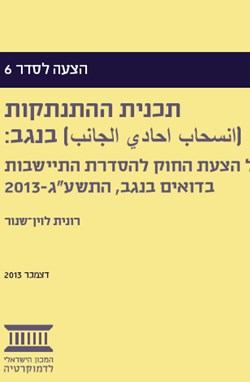Regulating Bedouin Settlement: A Disengagement Plan for the Negev
Motion for the Agenda 6
- Written By: Ronit Levine-Schnur
- Publication Date:
An analysis of the governmental bill for regulating Bedouin settlement in the Negev, which would implement a comprehensive solution to the land dispute between the State of Israel and the Bedouin minority, especially regarding the “unrecognized villages” in the Negev.
Deciding the future of the governmental bill for regulating Bedouin settlement in the Negev is one of the greatest challenges facing the 19th Knesset. The proposed law would implement a comprehensive solution to the land dispute between the State of Israel and the Bedouin minority, especially regarding the dozens of “unrecognized villages” that are home to approximately 90,000 people. The bill requires the Bedouin whose claims have not yet been settled to choose, within a short period of time, between pursuing their claims in court and receiving compensation in money and land. It also grants a plot of land to any Bedouin in the Negev who does not have a residential plot, in exchange for leaving the land that he or she currently occupies. At the end of the designated period of regulation, the state will be authorized to conduct accelerated eviction proceedings and register the remaining land in its name.
Regulating Bedouin Settlement: A Disengagement Plan for the Negev, a study by Ronit Levine-Schnur of the Hebrew University of Jerusalem, offers a comprehensive analysis of the bill and examines whether the complex legal arrangements that it proposes strike an appropriate and constitutional balance between the rule of law and human dignity, and between the desire to develop the Negev for all of its inhabitants and the obligation to act equitably and without discrimination.
The examination of the details of the proposed legislation reveals a harsh picture:
- The bill denies procedural rights; for example, in the context of the authority to evict occupants of land.
- The bill keeps excessive power in the hands of the State; for example, regarding the location of the land to be awarded as compensation.
- The bill would cause excessive harm to community and family ties; for example, it lacks resettlement arrangements that preserve the community-family structure and makes land compensation conditional upon the actions of the other partners or heirs.
- The bill does not contend appropriately with the anticipated democratic norms of representation and transparency, and seeks to limit the power of the court, while leaving numerous issues to administrative discretion that is not subject to judicial review.
It appears that the bill is motivated by fear of a Bedouin takeover of the Negev, and therefore grants unusually strong powers to the state. The intensity of this concern, however, is extremely exaggerated. For example, the lands in dispute constitute less than 2% of the territory of Israel and less than 3% of the Negev. In addition, over two thirds of all Bedouin claims have already been decided in favor of the state.
Based on the findings of this study, it is recommended that the proposed bill be amended as follows:
- The authority to evict, as stipulated in the bill, should be drastically changed.
- Clear arrangements should be defined for publishing announcements and declarations. Similarly, guidelines should be set up for ensuring the transparency of the proceedings of the committees that will be established under the law, and for guaranteeing representation of the Bedouin public in these bodies. To the extent possible, the determination of important arrangements should not be left for future by-laws.
- The court’s authority should not be limited with regard to stays of proceedings, granting interim orders, exercising judicial review, and hearing claims, even if the claimants have not requested this.
- The possibility of preserving the community-family structure during resettlement should be anchored in the law.
- In the matter of land compensation, the distinction between claimants whose authorization rate for their claim to a plot that they own with a co-claimant is 50% or more and claimants whose authorization rate is lower should be eliminated, as should the distinction between claimants who possess land and claimants who do not.
- After being informed of the quality and location of the land slated to be awarded as compensation, the claimant should have the option of changing his or her mind about accepting the land compensation and should be able to turn to the court to adjudicate the case.
Adopting arrangements in the spirit of the recommendations of this study would ensure the suitability of compensation and the fairness of the proceedings. It would also strengthen the relations between the State of Israel and its Bedouin citizens, and avoid exacerbating the sense of alienation and detachment that this minority group feels.
Ronit Levine-Schnur is a doctoral student in the Faculty of Law at the Hebrew University of Jerusalem, and holds an MA degree in law and urban and regional planning. Her research interests are in property, land use and planning law, urban development and urban justice, and she lectures on these topics at the Hebrew University of Jerusalem and in the Urban Design program at the Bezalel Academy of Art and Design.
This study has been published as part of IDI’s Equality and Israel's Arab Population project.

